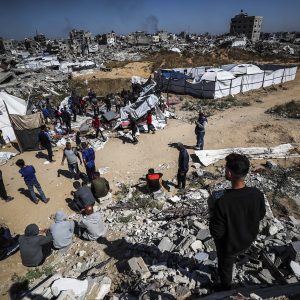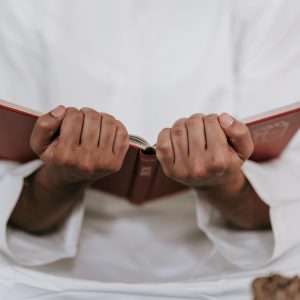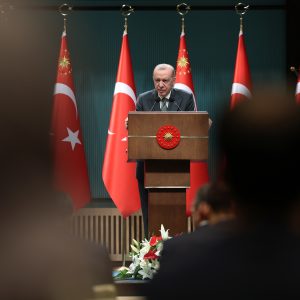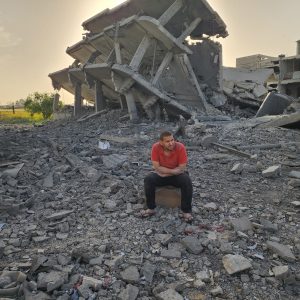Israel’s attacks, harassment, unprecedented censorship aimed at news blackout: Committee to Protect Journalists
ANKARA (AA) – Israel’s war on Gaza has been deadly for journalists – the deadliest ever conflict for media workers, specifically because of the high number of fatalities in such a short period of time, says the Committee to Protect Journalists (CPJ).
CPJ data as of December 17 shows at least 64 media workers killed since October 7, while Gaza’s Media Office puts the number at 95.
The Gaza Media Office has repeatedly condemned what it says is Israel’s intentional targeting of journalists in the besieged territory, stressing that these attacks are aimed at silencing Palestinian voices, concealing the truth and preventing news and information from reaching international audiences.
There is another entire layer of Israeli tactics against journalists, one that Sherif Mansour, Middle East and North Africa program coordinator for CPJ, says is reflected in the “unprecedented level of censorship and harassment, (and) the detention of journalists in Gaza, the West Bank, and in Israel.”
One recent example of Israeli aggression against media workers came to light last Friday, when Israeli forces violently attacked photojournalist Mustafa Alkharouf, who was on duty in occupied East Jerusalem.
Alkharouf was attacked while covering Palestinians gathered near the Al-Aqsa Mosque to pray, as Israeli army restrictions on Friday prayers at the mosque went into their 10th week.
Israeli personnel also attacked cameraman Faiz Abu Rumaila, who was with Alkharouf.
The brutal assault, which led to Alkharouf being hospitalized, was captured on camera, sparking outrage and widespread condemnation.
– Arrests –
While the officers involved were suspended, Israel’s far-right National Security Minister Itamar Ben-Gvir openly came out in their support, a testament to the current government’s blatant disregard for international law and the rights of journalists.
“As many as 19 Palestinian journalists were arrested and put in military prosecution and administrative detention. Some of those who were released are under house arrest in conditions that do not allow them to operate,” Mansour said.
He also spoke about the wartime regulations passed in mid-October by Prime Minister Benjamin Netanyahu’s cabinet, allowing the government to temporarily shutter foreign media deemed a threat to national interests.
“For the first time, the Israeli government has passed an emergency legislation that allows it to stop broadcasts of foreign news outlets. They’ve already used it to shut down Palestinian radio and media outlets in the West Bank,” he said.
The same rules could also be applied to Israeli journalists, who “can be prosecuted and put in jail for up to a year on weak accusations of harming national morale and national security,” he explained.
“All of this unprecedented censorship … along with the communications blackout that we have seen happen at least five times now in Gaza, because of bombardment to communication towers and lack of fuel and facilities to continue to operate them … leads to a news blackout, which has huge consequences,” Mansour asserted.
This has real-life consequences for millions of people in Gaza, as well as millions more around the world “who are following this conflict and trying to understand it,” he said.
“They can only rely on Palestinian journalists in Gaza to give them firsthand accounts of what’s happening there. Otherwise, they’re only left with mis- and disinformation that can only fuel the conflict,” he added.
– ‘Israeli army has not respected press insignia’ –
Israel’s deadly aggression against journalists is not a new phenomenon, with CPJ detailing “20 cases of journalists being killed by IDF fire over 21 years,” according to Mansour.
“Thirteen out of the 20 were killed in the past Gaza wars … We have seen the deadly pattern that we warned about before the war became more deadly. It was one journalist killed every year almost, before it became about one journalist killed per day during this war,” he said.
“Other points we’ve raised was the fact that the Israeli army has not respected the press insignia, press markings and protective gears on broadcast vans and vehicles in the past – 13 out of the 20 journalists killed by the IDF fire before this war had press insignia and they were killed by the Israeli army. We’ve seen this pattern repeat.”
This pattern goes to show the disregard of the Israeli army for all rules of engagement and also obligations under international law, he said.
Another clear trend with Israel is the “pattern of responses … to evade responsibility,” according to Mansour.
“That includes not making any real transparent, serious investigation … but only announcing investigations when the journalist was working with an international news organization or had a foreign passport,” he said.
“Even when they do so, there is usually a cursory preliminary report that doesn’t lead to any conviction or charges being filed.”
While the Israeli army tends to “respond a lot more quickly and even apologize” when the journalists involved are from an international organization, there is not “much investigation … for a lot of the local freelance journalists because they don’t have the newsroom support behind them,” he added.
Apart from evading responsibility, Israel is also known to “push false narratives” when it comes to attacks on journalists, according to Mansour.
“That happened with Shireen Abu Akleh and happened with Yasser Murtaja, who was killed in 2018 in Gaza by an Israeli bullet. He was immediately labeled a ‘terrorist’ … and later on, they said that he received money from Hamas,” he said.
“Those claims were refuted when the US government said that they funded his organization and that they had vetted him. We see similar smear campaigns against local Palestinian journalists … putting these journalists, who have already paid a huge toll and continue to do so, under further imminent threats.”
– Call for International Criminal Court action –
Mansour asserted that the “law is clear” when it comes to attacks on journalists.
“Targeting them, targeting media facilities is a war crime, not just because they are civilians, because they also have a role to play in times of war,” he said.
He reiterated that Israel and its government “cannot evade the responsibilities and obligations under international law.”
“The law, the Geneva Accords, is accepted by more than 190 nations since it was enshrined, and it holds everyone, including state and non-state actors responsible,” he said.
Mansour stressed that “any violation of international law against journalists should be investigated as a possible war crime.”












